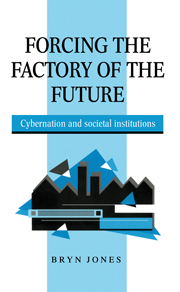Book contents
- Frontmatter
- Contents
- List of figures
- List of tables
- Acknowledgements
- List of acronyms and abbreviations
- Part I The workshop versus the factory
- Part II Technologies of control
- Part III Cybernation and flexibility
- Overview
- 6 The cybernated factory and the American dream
- 7 An American deviant: FMS at Alpha
- 8 Easy-peasy Japanesy: flexible automation in Japan
- 9 Revolution from above: FMS in Britain
- 10 The third Italy and technological dualism
- 11 Conclusion: the struggle continues
- Appendix: sources and methods
- Notes
- Bibliography
- Index
Overview
from Part III - Cybernation and flexibility
Published online by Cambridge University Press: 06 July 2010
- Frontmatter
- Contents
- List of figures
- List of tables
- Acknowledgements
- List of acronyms and abbreviations
- Part I The workshop versus the factory
- Part II Technologies of control
- Part III Cybernation and flexibility
- Overview
- 6 The cybernated factory and the American dream
- 7 An American deviant: FMS at Alpha
- 8 Easy-peasy Japanesy: flexible automation in Japan
- 9 Revolution from above: FMS in Britain
- 10 The third Italy and technological dualism
- 11 Conclusion: the struggle continues
- Appendix: sources and methods
- Notes
- Bibliography
- Index
Summary
Futurist assumptions dominate much academic discussion of the implications of the move to computer integrated production. Such influence extends to radical critics, such as the Marxist historian David Noble, for whom the promotion and propagation of CIM is the inevitable consequence of long-standing, grand designs, stretching back to the development of NC, to extend corporate control at the expense of worker resistance. Futurist thinking has swayed the managerial literature even more. Accepting the future path of cybernation as already mapped out by technologists, the task of managers and their advisers is seen as devising and promoting appropriate organisational and human relational infrastructures to realise the technology's full economic potential. Analysis is consequently predicated on the assumption of a huge, beneficial potential locked up in the technology; which the right business and management policy recipes can realise.
More active participants in these and related developments – usually engineers – often have a hard-nosed Fordist, or Taylorist view of their potential. Yet management academics often view such approaches mainly as contrasts with the essence and potential of FMS – as innovative, post-Fordist versatility with skill-based flexible work roles. Bessant, for example, emphasises the tendency to use FMS for ‘operational flexibility’: gains of task-minimising, time-saving, machine use-maximising etc. Or ‘even, in many cases, for traditional cost-saving motives’ (Bessant 1991, p. 110). Yet, Bessant then goes on to measure such cases against more innovative uses of FMS, ‘optimal arrangements’, ‘economies of scope’ coupled with less specialised and more autonomous workgroups (Bessant 1991, pp. 116–26).
- Type
- Chapter
- Information
- Forcing the Factory of the FutureCybernation and Societal Institutions, pp. 129 - 130Publisher: Cambridge University PressPrint publication year: 1997



